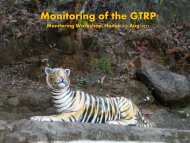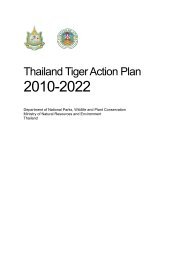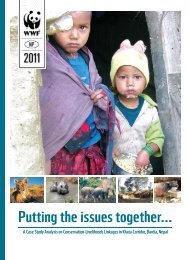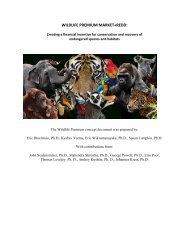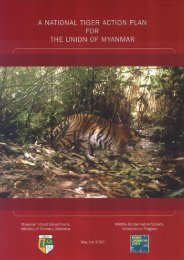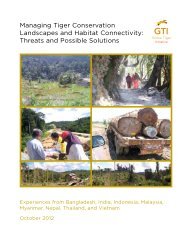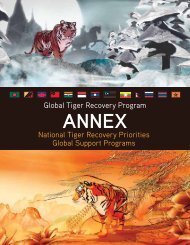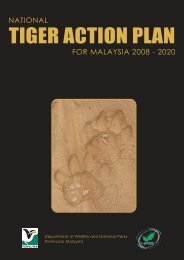Download - Global Tiger Initiative
Download - Global Tiger Initiative
Download - Global Tiger Initiative
You also want an ePaper? Increase the reach of your titles
YUMPU automatically turns print PDFs into web optimized ePapers that Google loves.
Providing human communities living locally to Snow Leopards with<br />
economic incentives for their conservation<br />
•<br />
•<br />
•<br />
•<br />
Income generating schemes<br />
Governments, resource managers and NGOs should assist local communities in the<br />
design, establishment and implementation of schemes that provide economic<br />
incentives to protect Snow Leopards and wild ungulates. Snow Leopard Enterprises<br />
is an example of such a wildlife stewardship scheme, where conservation agreements are<br />
signed with communities willing to protect Snow Leopards and their habitats, in exchange<br />
for economic incentives and/or skills training. These schemes could result in the<br />
generation of income which would eradicate the need to rely on poaching of wildlife, and<br />
would enable herders to tolerate livestock losses to Snow Leopards, to a certain extent.<br />
Ultimately, these programmes could result in a lesser dependence on livestock as a means<br />
of livelihood, owing to the additional income generated and the increased use of more<br />
productive breeds. The involvement of a wide range of local stakeholders in the design<br />
and development of these schemes is critical to their success. Products from such schemes<br />
should be promoted in the media and via conservation NGOs, particularly in affluent<br />
countries, as beneficial to Snow Leopard conservation.<br />
Livestock insurance schemes<br />
NGOs, development agencies and resource managers working with local<br />
communities in Snow Leopard range States should assist local communities in<br />
developing livestock insurance schemes, where appropriate. Taking into account<br />
lessons learnt from livestock insurance schemes already in place, attention should be given<br />
to ensure that these systems are economically sustainable, locally administered and<br />
effective in preventing retaliatory killings of predators. These schemes should be designed<br />
and developed in close co-operation with the affected communities and should incorporate<br />
a livestock insurance plan where stock owners contribute to a common fund, administered<br />
at local level, thus reducing likelihood of fraud and other problems inherent in direct<br />
compensation.<br />
Community-based trophy-hunting programmes<br />
Governments, resource managers, hunting agencies and NGOs should assess the<br />
feasibility of establishing programmes for community-based trophy-hunting of wild<br />
ungulates and other mammals, as a tool to provide economic incentives for local<br />
communities to conserve wildlife and habitats. The revenue generated from these<br />
hunting programmes should be re-invested into conservation programmes that aim to<br />
provide incentives to local communities to conserve wildlife and its habitat. These could<br />
be administered through community-based conservation trust funds. The programmes<br />
should also be accompanied by regular scientific surveys that monitor potential impacts on<br />
the population of the affected species.<br />
Tourism programmes<br />
The establishment of conservation-based tourism programmes should be promoted,<br />
to bring additional income to local communities through the establishment of conservation<br />
trust funds. Such programmes, for example Traditional Village Homestays in<br />
Ladakh, should take into account the environmental, socio-economic and cultural risks<br />
60 FADING FOOTPRINTS: the killing and trade of Snow Leopards




